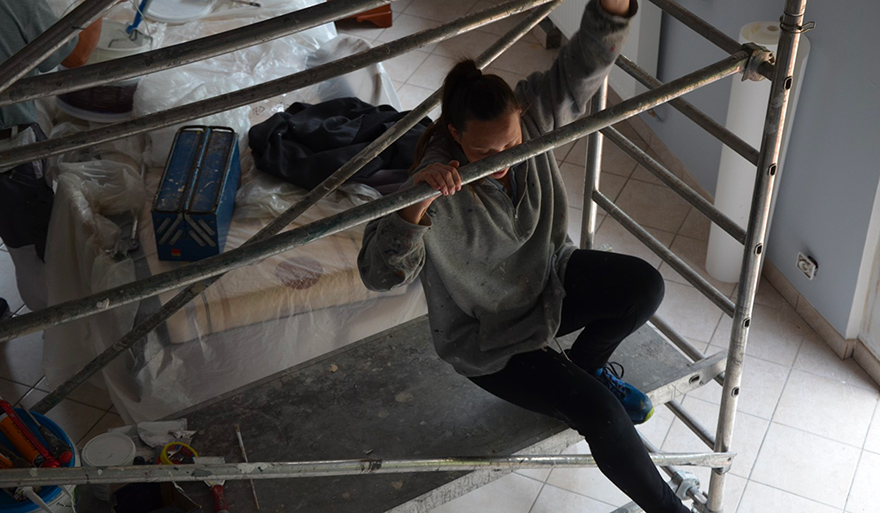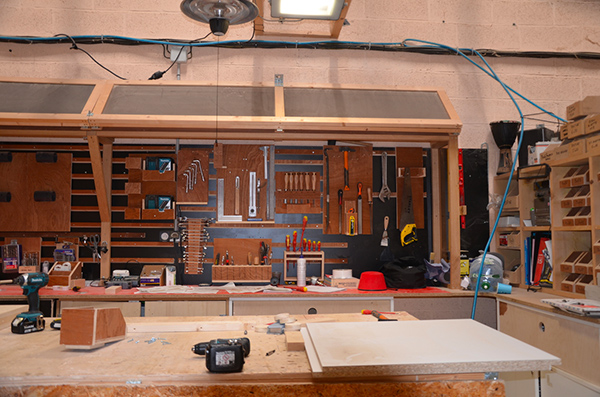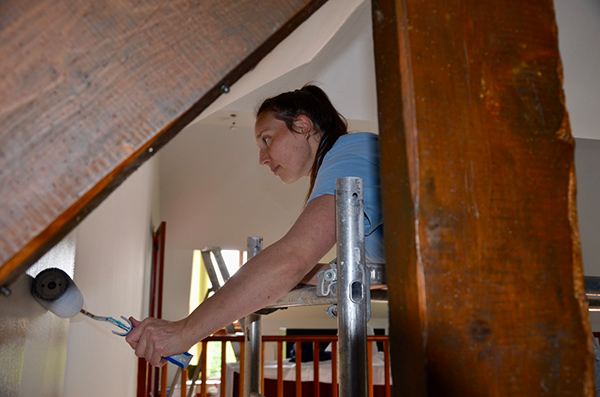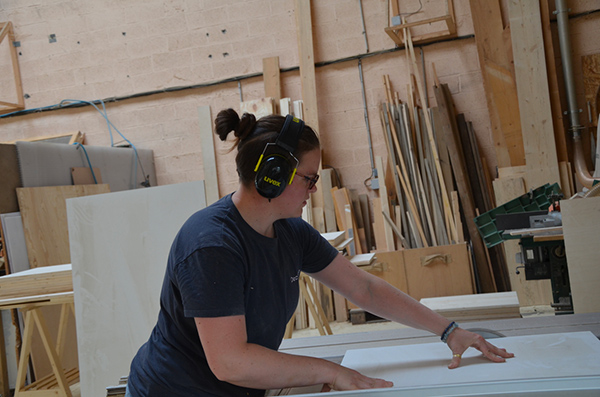When public buildings and works try to woo women
In France, training centres for public buildings and works have been trying to attract more women. To that end, they integrated the European “Women Can Build” project, financed by the Erasmus+ program in 2017, to make the sector more open to women, who tend to be less inclined towards such career paths than men.

Roubaix (Poland)
On her office computer screen, photos of young women in blue overalls scroll by. "They called her Barbie. She had long blond hair and pink nails," says Emilie Gaeremynck, a counsellor at the Lille Metropolitan Apprentice Training Centre (CFA), located in Roubaix North. "But they all played ball", recalls the woman whose task it is to accompany the students on their journey.
In January 2020, a group of young women who were having a difficult time entering the job market discovered the building sector. The project had a dual objective: to enable such women to find their vocation, and at the same time deconstruct gender stereotypes in the construction industry.
In 2016, the French Building Federation was 12 percent women. While this figure is rising, women represented only 1.6 percent of workers on building sites. Gaeremynck recounts the reluctance of employers: "It's going to be complicated with my guys", "they’re less productive than a man", "I don't have the money to invest in separate changing rooms".

As the bell rings and the counsellor rises from her chair she adds: "but I hear these clichés less and less”. There are also bosses who are looking specifically for women: "we’re told they’re more meticulous, more organised and better at dealing with customers."
A minor breakthrough at Lille CFA
In the college corridors, apprentices nod as she passes. Currently, female faces are rare. "Of 700 apprentices, between 25 and 30 are women,” says Gaeremynck. Interest among women in training for the building trades is still low. "That's why the discovery sessions are important. Of the ten or so girls who came in 2020, two enrolled in the CFA the following year. It's not much, but it's a good start," she says.
Most of these apprentices are training to be carpenters, plumbers or roofers. "We don't have any masonry apprentices yet," says the advisor. With a sigh, she adds: "we have to break the glass ceiling. It’s still very thick.”
Perched atop a scaffold more than four metres high in a country house a few kilometres from the Belgian border, Euphrasie Desruez, 29, confirms Gaeremynck’s statements between two brush strokes. "I have friends who took a long time to get into the building trade, after being discouraged by their parents," explains the young painter, an apprentice at the Lille CFA who also works in the family business created by her grandfather in 1968. "I never imagined myself in this sector either, even though I've been in it since I was a little girl," she says.
Eventually, Desruez discovered her affinity for painting. She will take over the business when her father retires in a few years, but first she hopes to have a second child. "I have a physical job and I am exposed to chemicals that are not recommended when you are pregnant. So I can't delay, since it’ll be too late by the time I take over the business," she says.

Desruez tightens her ponytail and takes off her grey top speckled with paint. In the end, she doesn't care how others view her job. "When I tell them I'm a painter, they often say, ‘what kind of paintings do you do?’ Then when they understand that I work in the building trade, they are always curious to know more. Often they become customers," she says mischievously.
Desruez is convinced that women have a place in this sector: "mentalities are changing. People are increasingly aware that the construction sector is suitable for women". She takes the example of a former classmate from the Lille Métropole CFA, who is now in the job market.
From apprentice to professional
The shriek of the table saw echoes in the Lille workshop as the wood dust swirls, some of it clinging to the worker’s black T-shirt. Clémence Lievens, 32 years old and a former apprentice at the CFA, has been employed for eight months in the company making furniture for suppliers. For the moment, she makes wooden tables with dividers.

The carpenter pulls her hard-hat down around her neck and grabs the measuring tape hanging on her denim trousers to take measurements. Satisfied, she lifts the board. "I've learned to carry like a man, by laying the material to its side. Sometimes I can lift up to 100 kg. So now I don't ask myself whether I can do it or not - I just do it," says the young woman with short-cropped hair. In her team of eight people, Clémence Lievens is not the only woman: two others work in the sewing workshop while another colleague deals with orders.
If she has found fulfilment in her position, it is due to Lievens taking the initiative after completing her training at the CFA in 2018. "During an interview, a recruiter insisted that I get secretarial work. Another time, when I visited the warehouse, I saw posters with naked women. I didn't want to work with people who talk about women like meat. In both cases, I didn't follow up," she says.
"I'm the only one in the team who has a diploma to use the sliding table saw," she declares, without intending to brag. Lievens recalls her first day at college. "As soon as I entered the workshop, I felt at home," she says with a slight smile.
However, her path to training in this sector was rather long. "I was pushed into general studies and spent five years studying communications and media. Until I moved into my first flat. I’d wanted to make my own furniture. That's when it all clicked," she explains while removing a splinter from her finger. Although the work is tough, Lievens loves her job. "I regret having spent so much time in general studies. But now I've found my way," she says, before returning to her tool.
 This article was produced as part of the Union Is Strength competition, organised by Slate.fr with the financial support of the European Union. The article reflects the views of the author and the European Commission cannot be held responsible for its content or use.
This article was produced as part of the Union Is Strength competition, organised by Slate.fr with the financial support of the European Union. The article reflects the views of the author and the European Commission cannot be held responsible for its content or use.